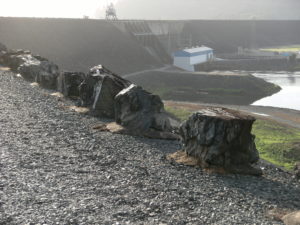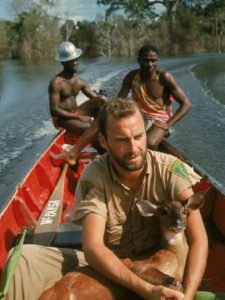The Afobaka Dam, in the South American country of Suriname, was closed (that is, became operational) officially on February 1, 1964. It began filling the Brokopondo Reservoir behind it, making the 41st largest reservoir in the world by surface area (approximately 580 square miles). It covers about 1% of the land area of Suriname, which is South America’s smallest country.

Construction of the dam began in 1961. The dam was built primarily to generate electricity to power the bauxite industry, the largest source of foreign trade for Suriname. Bauxite ore is refined to make aluminum. The dam is privately owned, by a subsidiary of Alcoa Aluminum. About 75% of the electricity produced is used by the aluminum industry; the other 25% goes to general use in the nation’s capital and largest city, Paramaribo.
The filling of the dam is noteworthy for a wild animal rescue operation, Operation Gwamba, that occurred in the first few years after the dam was closed. Organized and operated by the International Society for the Protection of Animals (now known as World Animal Protection), the project was led by John Walsh, a U.S. biologist with no previous experience in the tropics or in animal capture and relocation. In all, Operation Gwamba rescued more than 10,000 animals, including more than 2000 sloths, 1000 armadillos, and nearly a thousand tortoises, tree porcupines and monkeys. At least one individual of 43 different species was captured.

The rescue operation mainly captured animals trapped on small islands created as the water rose, isolating former hill-tops into ever-shrinking land areas. The animals were then moved onto shoreline areas not subject to flooding.
Operation Gwamba was memorialized in the 1967 book, Time is Short and the Water Rises, co-authored by John Walsh and Robert Gannon. Walsh wrote, “The most valuable thing from my point of view, of course, was what I learned about the jungle. I found out that, as I had suspected, it is not something evil, dreary, and cruel….Furthermore, if you enter the jungle with plenty of food, go to a place where clean water is abundant, stay away from your fellow human beings, and don’t get lost or go out of your way to play with bushmasters, you’ll be relatively safe.”
References:
United Caribbean. Suriname—Afobaka Dam. Availabe at: http://www.unitedcaribbean.com/afobakadam.html. Accessed January 31, 2017.
Walsh, John and Robert Gannon. 1967. Time is Short and the Water Rises. Tower Publications, New York. 262 pages.
